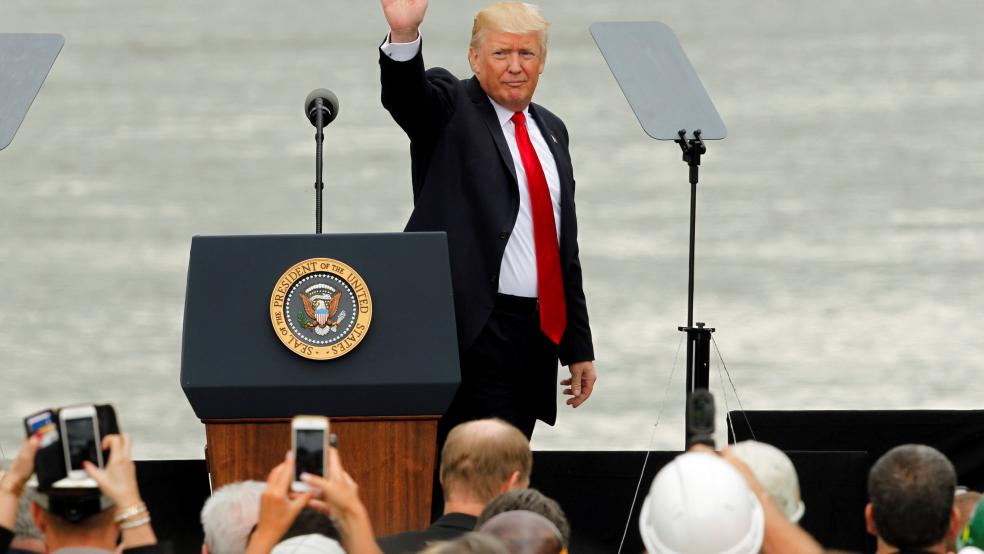WASHINGTON (Reuters) - U.S. President Donald Trump would not insist on including repeal of an Obama-era health insurance mandate in a bill intended to enact the biggest overhaul of the tax code since the 1980s, a senior White House aide said on Sunday.
The version of tax legislation put forward by Senate Republican leaders would remove a requirement in former President Barack Obama's signature healthcare law that taxes Americans who decline to buy health insurance."If we can repeal part of Obamacare as part of a tax bill ... that can pass, that's great," White House budget director Mick Mulvaney said on CNN's "State of the Union" on Sunday. "If it becomes an impediment to getting the best tax bill we can, then we are OK with taking it out."It was too soon to say whether eliminating the repeal of the so-called individual mandate would increase the bill's chances of passing. The provision was not an impediment now, Mulvaney said.Republican senators who have been critical of the plan said that some middle-income taxpayers could see any benefits of the tax cuts wiped out by higher health insurance premiums if the repeal of the Obamacare mandate goes through.Among them was Senator Susan Collins, one of a handful of Republicans who voted in July to block a broader Republican attempt to dismantle the Affordable Care Act, commonly known as Obamacare."I don't think that provision should be in the bill. I hope the Senate will follow the lead of the House and strike it," Collins said on CNN's "State of the Union."Republicans can only afford to lose two votes on the tax bill because of their slim 52-48 majority in the Senate.Getting rid of the mandate is one of Republican Trump's main goals. He campaigned for president last year on a promise to repeal and replace Obamacare, but Congress has not agreed so far on how to do that.Another top Trump administration official, Treasury Secretary Steve Mnuchin, said the individual mandate "isn't a bargaining chip.""The president thinks we should get rid of it and I think we should get rid of it," he told "Fox News Sunday." Mnuchin said the objective "right now" was to keep repeal of the mandate in the bill. "We are going to work with the Senate as we go through this. We are going to get something to the president to sign this year," he said.The House of Representatives last week passed its tax bill. Republicans, who control both chambers of Congress, consider a tax bill critical to their party’s prospects in the 2018 U.S. congressional elections. Democrats call the Republican plan a giveaway to corporations and the rich.'NEEDS WORK'Trump had urged lawmakers to add repeal of the mandate to the tax bill, writing on Twitter last week that the provision was "unfair" and "highly unpopular." The next day, Senate Majority Leader Mitch McConnell did just that.The mandate plays a critical role in Obamacare by requiring young, healthy people, who might otherwise go without coverage, to purchase insurance and help offset the costs of covering sicker and older Americans.The nonpartisan Congressional Budget Office has said that repealing the mandate would increase the number of Americans without health insurance by 13 million by 2027.Republican Senator Roy Blunt said he thought the Senate bill would pass with or without the individual mandate repeal. "It depends on where the votes are," he told NBC's "Meet the Press."Appearing on several television shows, Collins said she also wanted the Senate to "skew more of the relief to middle-income taxpayers." She advocated keeping the top tax rate of 39.6 percent for people who make $1 million or more a year, as the House does, as well as the deduction for state and local taxes.The corporate tax does not need to be cut so steeply to 20 percent, Collins said. A 22 percent rate would garner an additional $200 billion and allow the Senate to restore the deduction for state and local property taxes, she told ABC.Collins has emerged as a pivotal lawmaker in the tax debate, along with Republican Senators John McCain, Lisa Murkowski and Ron Johnson, all of whom are also on the fence or oppose the bill.The Senate bill needs work, Collins told ABC's "This Week." "I want to see changes in that bill," she said. "And I think there will be changes." (Reporting by Lucia Mutikani and Valerie Volcovici; Writing by Doina Chiacu; Editing by Grant McCool and Peter Cooney)Trump open to dropping healthcare provision in Senate tax bill: aide

STEPHANIE KEITH



